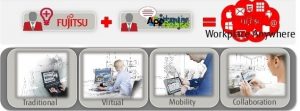Fujitsu today added powerful analytical capabilities to its Workplace Anywhere portfolio of enterprise managed workplace services. Enterprises now have access to performance telemetry and end-user data to gain insights into both users’ hardware and usage patterns, helping CIOs and IT Directors to strike the balance between empowering employees and meeting their own visibility and data security needs.

The analytics, based on Lakeside Software’s SysTrack, enhance Fujitsu’s industry-leading 1,2 end user services by providing IT teams with insightful telemetry data. Armed with a detailed overview of all aspects of their workplace environment, CIOs can make better implementation decisions and deploy available IT resources more effectively. In addition, being able to immediately identify the source of any issues results in speedy resolutions, and enhances the user experience. Data security, support, procurement and risk management can now be overseen from a central console.
Gaining insights into employee usage patterns is critical as device, applications and data delivery options become ever more numerous and sophisticated. Karyn Jeffery, Head of End User Services, Global Delivery, at Fujitsu, comments “Today’s workforce demands increasing levels of flexibility and mobility in terms of access to data and applications, and users expect a consistent experience, regardless of the device they are using. Managing an enterprise’s end user computing in such complex environments requires not only an agile and flexible framework but also access to empirical data to help manage application change and deploy new technologies.”

The data provided by Fujitsu End-User Analytics answers essential questions including:
- When do we need to upgrade a user’s platform?
- Can the user be migrated to a new operating system?
- When can we retire an application?
- What impact will a system upgrade or replacement have?
- Are employee’s applications performing well?
- What quality of IT services are we delivering?
These insights will be invaluable for CIOs and IT Directors who are currently faced with the prospect of having to upgrade many thousands of users to Windows 10, as free support for Windows 7 reached end-of-life this year. Fujitsu End-User Analytics can easily pinpoint devices not capable of supporting the new operating system, enabling pre-emptive hardware upgrades where required to manage the rollout while minimizing any downtime or other inconvenience for users.
Tal Klein, Vice President of Strategy, Lakeside Software, says: “Nearly half of the end user services budget is committed to delivering a quality experience to every single user. Unfortunately, traditional IT had no clear visibility into the user experience. Fujitsu end user analytics customers gain visibility into and control over the impact of technology on business productivity.”
Teams or business units typically implement ‘shadow IT’ in the form of unauthorized devices or applications, when corporate IT departments move too slowly to provide them with the tools they need to be productive. However, when IT departments are able to understand which applications are in use, they are in turn able to identify and mitigate the risks associated with them. As a result, the enterprise can be more agile in terms of responding to users’ actual needs. Furthermore, the same data that tracks actual user behavior and application use can help drive down the cost of unnecessary software licenses, by identifying unused applications and reassigning software accordingly.






